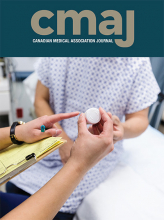See related articles at www.cmaj.ca/lookup/doi/10.1503/cmaj.230776 and www.cmaj.ca/lookup/doi/10.1503/cmaj.231583
This issue of CMAJ includes the first of a new article type on the topic of trust in health care, developed in collaboration with CMAJ’s patient advisory panel. Why focus on trust? Some physicians on CMAJ’s practice advisory panel raised the issue in a meeting in 2022, saying that they had been finding it increasingly difficult to establish and maintain trust with some of their patients, and expressing a desire to understand why this was happening and how to re-establish trust. Members of CMAJ’s patient advisory panel agreed that trust between patients and providers is critical, and the topic was therefore chosen as the focus for 1 of 2 new article types that centre patient experience.1
In the first Trust in Health Care article, Louis Lochhead describes a breakdown in trust between himself and the critical care team attending to his wife, who had suffered a severe head injury, and a contrasting experience of interacting with his wife’s rehabilitation team.2 In a related commentary, Francois Lamontagne, a critical care physician, reflects that clinicians must honestly acknowledge prognostic uncertainty, that it is important to revisit decisions when a patient’s condition changes, and that open communication between patients and clinicians can help to maintain trust even when there are differences in preferences and values.3
Trust is relational. In health care, it is something that exists between people, as well as between people and organizations or services. Individuals’ trust in health-related information is also key.4 Many factors contribute to patients’ trust in the people and organizations involved in providing care, including transparency of information, accessibility of services, quality of communication and the way in which patients are treated when they engage with services. Building and maintaining trust takes consistent effort, and trust can be easily broken. Some groups of people are more likely to experience discrimination and to experience harm in health care encounters, which erodes trust. On the other hand, patients who trust their health care providers have more positive views about the quality of their care and better self-reported health.5
Our hope is that articles in this new category will allow patients and caregivers to shed light on important aspects of trust that will help health care providers and organizations better understand how to earn and keep trust. Articles must be written by patients, nonprofessional caregivers, or patients together with their health care providers. Articles should describe a clinical encounter or health care–related experience in which trust was gained, lost or both. They should describe mechanisms through which trust can be gained or lost and reflect on the lessons offered about how to improve trust in health care.
CMAJ editors are grateful to patients who are willing to share their experiences publicly. When articles written by patients are taken through our editorial process — which includes external peer review — editors are aware of the potential for authors to experience harm. We are conscious that if someone has a story to share about broken trust, they have likely experienced trauma — whether related to the behaviour of a health care provider, system-level bias, miscommunication or error. Editors are therefore committed to taking a kind and considerate approach to the peer review of articles in this series. We will view submissions through a lens of understanding that authors may be retraumatized by sharing their experiences. We will remind peer reviewers of this — asking them to be respectful and constructive.
Guidance for authors interested in submitting an article on trust — with details on the topics of interest, content, format and review process — is available at https://www.cmaj.ca/submission-guidelines#humanities. For patients who have a story to tell but may not be able to write the article themselves (e.g., because they are not fluent in English), CMAJ can offer assistance — or other options, such as an interview for an In Their Own Words article (https://www.cmaj.ca/own_words). Patients and caregivers interested in contributing their experience can email PatientEngagement{at}cmaj.ca if they would like to discuss an idea or solicit guidance from an editor.
Footnotes
Competing interests: www.cmaj.ca/staff
This is an Open Access article distributed in accordance with the terms of the Creative Commons Attribution (CC BY-NC-ND 4.0) licence, which permits use, distribution and reproduction in any medium, provided that the original publication is properly cited, the use is noncommercial (i.e., research or educational use), and no modifications or adaptations are made. See: https://creativecommons.org/licenses/by-nc-nd/4.0/











